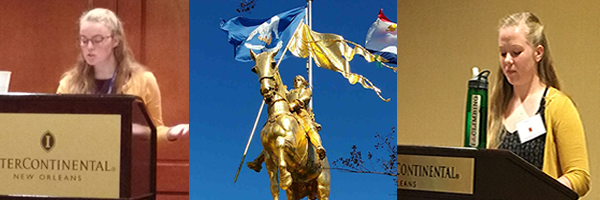
Two Longwood history majors presented the findings of their recent research at the National Conference of the Phi Alpha Theta History Honor Society, 3-6 January 2018, in New Orleans, Louisiana.
Maeve Losen (’18, above right) presented an analysis of FDR’s fourth inauguration in January 1945 and how it reflected the tone of the war, a little over three years after the US entry into the global conflict. Losen’s research began in Dr. Melissa Krazetz’s Historical Methods class, and she expanded on her original paper for the conference.
Mary Zell Galen (’19, above left) demonstrated her findings about the cultural reactions and changes as Great Britain left the gold standard in 1797 as part of its effort to combat the French Revolution. Galen’s research began during the 2017 SURI (Summer Undergraduate Research and Inquiry) program, which helped fund Galen’s research.
They both plan to follow up with presentations at the Virginia Phi Alpha Theta conference this March.
In November 2017, Losen and Galen also presented at the National Collegiate Honors Council’s annual conference in Atlanta. Losen presented on the effects of foreign involvement on the American Revolution while Galen analyzed the impact of the Warsaw Ghetto Uprising on American journalism.

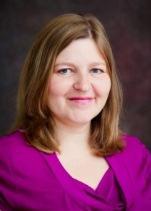 Dr. Yulia Uryadova has published an article in The Social History of Alcohol and Drugs: An Interdisciplinary Journal. Her article, “Prostitution, Alcoholism, and Drugs: Social disorder in imperial Ferghana, examines the rise of prostitution and the spread of alcoholism and drug use in the heartland of Central Asia, the Ferghana Valley, from 1905 to 1914. Russian fears of possible revolt by the Muslim population intensified as social problems manifested in the early twentieth century. These issues were not just threats to social stability. Because Muslims considered these alien importations attributable to a corrupt Russian culture and empire, the appearance of social problems contributed to political problems. While Russian authorities presented revolt as the out
Dr. Yulia Uryadova has published an article in The Social History of Alcohol and Drugs: An Interdisciplinary Journal. Her article, “Prostitution, Alcoholism, and Drugs: Social disorder in imperial Ferghana, examines the rise of prostitution and the spread of alcoholism and drug use in the heartland of Central Asia, the Ferghana Valley, from 1905 to 1914. Russian fears of possible revolt by the Muslim population intensified as social problems manifested in the early twentieth century. These issues were not just threats to social stability. Because Muslims considered these alien importations attributable to a corrupt Russian culture and empire, the appearance of social problems contributed to political problems. While Russian authorities presented revolt as the out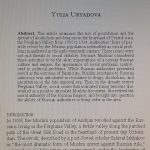 come of fanaticism, Muslim resistance to Russian autocracy was articulated in resistance to drugs, alcoholism, and prostitution in the late imperial era. Thus, in the already restive Ferghana Valley, social issues that indicated rising tensions also worked to articulate Muslim discontent, discredited the moral authority of the Russian Empire, and brought into question the ability of Russian authorities to bring order in the area.
come of fanaticism, Muslim resistance to Russian autocracy was articulated in resistance to drugs, alcoholism, and prostitution in the late imperial era. Thus, in the already restive Ferghana Valley, social issues that indicated rising tensions also worked to articulate Muslim discontent, discredited the moral authority of the Russian Empire, and brought into question the ability of Russian authorities to bring order in the area.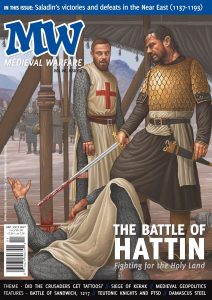 contributed to two issues of the magazine Medieval Warfare. For the Sept/Oct issue (VII.4), Isaac returned to one of his “favorite” mercenary-villains, Eustace the Monk, who was–as his name indicates–a former man of the cloth who returned to secular life. When local politics left him homeless, Eustace sold his services alternately to either the king of England or to Prince Louis of France, acting as a sea-captain, privateer, or pirate (depending on whose coasts were being protected or ravaged, and which year it may have been). In 1216, Eustace met his end at the Battle of Sandwich, the first fully naval battle of the Middle Ages. The English victory over their former ally meant that the young King Henry III, not Prince Louis of France, would control England. Besides those important facets, th
contributed to two issues of the magazine Medieval Warfare. For the Sept/Oct issue (VII.4), Isaac returned to one of his “favorite” mercenary-villains, Eustace the Monk, who was–as his name indicates–a former man of the cloth who returned to secular life. When local politics left him homeless, Eustace sold his services alternately to either the king of England or to Prince Louis of France, acting as a sea-captain, privateer, or pirate (depending on whose coasts were being protected or ravaged, and which year it may have been). In 1216, Eustace met his end at the Battle of Sandwich, the first fully naval battle of the Middle Ages. The English victory over their former ally meant that the young King Henry III, not Prince Louis of France, would control England. Besides those important facets, th e battle became infamous in later retellings as Eustace’s seafaring prowess was attributed to black magic.
e battle became infamous in later retellings as Eustace’s seafaring prowess was attributed to black magic.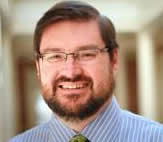 Dr. William Holliday, Associate Professor of History recently published an article with Dr. Lily Anne Goetz (EML) titled “Designing Programs to Foster Intercultural Competence through Interdisciplinary Study Abroad” in NECTFL Review 80 (September 2017): 11-46.
Dr. William Holliday, Associate Professor of History recently published an article with Dr. Lily Anne Goetz (EML) titled “Designing Programs to Foster Intercultural Competence through Interdisciplinary Study Abroad” in NECTFL Review 80 (September 2017): 11-46.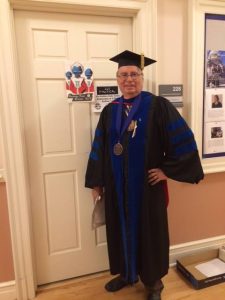 William Harbour was among 7 faculty honored for their contributions to the university, their disciplines, and students. The department’s own Dr. Harbour won the Maude Glenn Raiford Award, given annually in recognition of outstanding teaching.
William Harbour was among 7 faculty honored for their contributions to the university, their disciplines, and students. The department’s own Dr. Harbour won the Maude Glenn Raiford Award, given annually in recognition of outstanding teaching.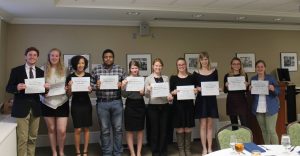 ngratulations to our award winners from last night’s Department banquet: Richard Couture Scholarship: Mary Zell Galen; Jamestowne Settlement Scholarship: Amanda McGregor; Dr. C. Gordon Moss: Elizabeth Puccinelli; James E. Walmsley Scholarship: Danyelle Henderson; Rena Weld Wheeler Scholarship: Lauren Gaines; Drs. Marvin and Dorothy Schlegel Prize: Evan Harvey and Rachel Hazelwood; Outstanding Senior in History: Sarah Tucker; Outstanding Freshman in History: Caroline Hilliard; Outstanding Senior in Political Science: MacKenzie Adamson and Christy Tagg; Outstanding Freshman in Political Science: Liam Murray.
ngratulations to our award winners from last night’s Department banquet: Richard Couture Scholarship: Mary Zell Galen; Jamestowne Settlement Scholarship: Amanda McGregor; Dr. C. Gordon Moss: Elizabeth Puccinelli; James E. Walmsley Scholarship: Danyelle Henderson; Rena Weld Wheeler Scholarship: Lauren Gaines; Drs. Marvin and Dorothy Schlegel Prize: Evan Harvey and Rachel Hazelwood; Outstanding Senior in History: Sarah Tucker; Outstanding Freshman in History: Caroline Hilliard; Outstanding Senior in Political Science: MacKenzie Adamson and Christy Tagg; Outstanding Freshman in Political Science: Liam Murray.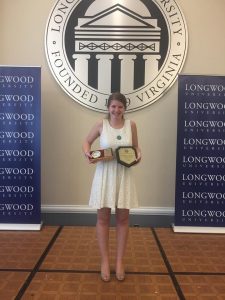 On Sunday, 9 April 2017, at the Citizen Leader Awards banquet, senior political science major Christy Tagg won the Distinguished Leader award and the Phyllis Mable Award for Outstanding Contribution to Longwood.
On Sunday, 9 April 2017, at the Citizen Leader Awards banquet, senior political science major Christy Tagg won the Distinguished Leader award and the Phyllis Mable Award for Outstanding Contribution to Longwood.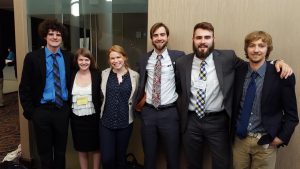 Six political science students — MacKenzie Adamson, Christy Tagg, Kyle Dobry, Joe Hyman, Franklin Marrs, Danny Bartle –attended the 2017 Model United Nations conference held in Charlotte, NC, 31 March-2 April. They presented on topics ranging from food security to water policy from the perspective of the Iraqi government. They debated and negotiated with students from around the country about these important issues. They participated in writing working papers and draft resolutions that were voted on by their respective committees.
Six political science students — MacKenzie Adamson, Christy Tagg, Kyle Dobry, Joe Hyman, Franklin Marrs, Danny Bartle –attended the 2017 Model United Nations conference held in Charlotte, NC, 31 March-2 April. They presented on topics ranging from food security to water policy from the perspective of the Iraqi government. They debated and negotiated with students from around the country about these important issues. They participated in writing working papers and draft resolutions that were voted on by their respective committees.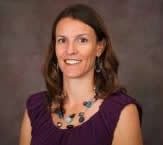 Dr. Melissa Kravetz, assistant professor of Modern German history, has had an article published in the Spring 2017 Journal of Women’s History. Her article, “Finding A Space In Schools: Female Doctors and the Reform of Girls’ Physical Education in Weimar Germany,” examined how women physicians in German vocational schools
Dr. Melissa Kravetz, assistant professor of Modern German history, has had an article published in the Spring 2017 Journal of Women’s History. Her article, “Finding A Space In Schools: Female Doctors and the Reform of Girls’ Physical Education in Weimar Germany,” examined how women physicians in German vocational schools 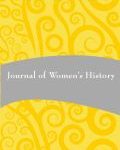 played a key role in educating working-class women about their health, all while dealing with class biases, the resistance of male doctors, and expectations about motherhood. For a fascinating look at “biopolitics” between the world wars,
played a key role in educating working-class women about their health, all while dealing with class biases, the resistance of male doctors, and expectations about motherhood. For a fascinating look at “biopolitics” between the world wars,